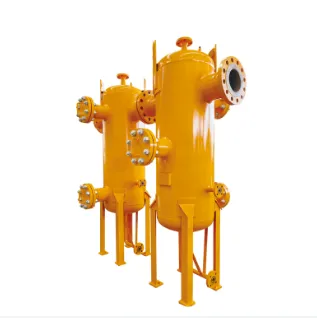
Mar . 14, 2025 10:42
Back to list
The application and importance of natural gas filter separators in the industrial field
In modern industrial production processes, natural gas filter separators, as an important pollution control device, have become increasingly prominent in their application and importance. With the continuous acceleration of industrialization, the impact of various gas emissions on the environment and human health is becoming increasingly serious. Therefore, how to effectively purify industrial waste gas and reduce the emission of harmful substances has become an important issue that urgently needs to be solved.

Natural gas filter separators are widely used in various industrial fields, including chemical, power, metallurgical, and automotive manufacturing
In the chemical industry, coalescing filters can effectively remove harmful gases generated during the process, such as ammonia, hydrogen sulfide, etc; Meanwhile, in the power industry, harmful gases such as sulfur dioxide and nitrogen oxides emitted by coal-fired power plants also need to be purified through gas filtration equipment to comply with national environmental regulations. In addition, the metallurgical industry releases a large amount of dust and harmful gases during the metal smelting process. The effective application of natural gas filter separators can not only reduce environmental pollution, but also protect the health of workers and reduce economic losses caused by occupational diseases.
Natural gas filter separators also play an important role in improving production efficiency
In certain production processes, impurities and pollutants in the air may affect the normal operation of equipment and the quality of products. The use of gas coalescer filters can ensure the cleanliness of the gas entering the production system, effectively preventing equipment failures and product defects, thereby reducing production costs and improving the competitiveness of the enterprise. At the same time, compliant exhaust gas treatment can also avoid fines and shutdowns caused by environmental issues, ensuring the sustainable development of enterprises.
The technological development and innovation of natural gas filter separators continuously promote the progress of the environmental protection industry
In recent years, with the rapid development of new material technology and nanotechnology, the performance and efficiency of gas coalescer filters have been significantly improved. For example, high-performance filter materials with higher capture efficiency and longer service life make natural gas filter separators more widely applicable and adaptable to more complex industrial environments. These technological advancements not only improve the effectiveness of gas filtration, but also reduce the frequency of equipment maintenance and replacement costs, saving valuable resources for enterprises.
The importance of natural gas filter separators is also reflected in their positive role in the context of global climate change
Coping with climate change and reducing greenhouse gas emissions are common challenges on a global scale. The use of natural gas filter separators can effectively control the emissions of greenhouse gases such as carbon dioxide and methane in industrial waste gas, help enterprises achieve green development goals, and promote the coordination and unity of economy and environmental protection.
In summary, the application of natural gas filter separators in the industrial field is not only a necessary means to meet environmental regulations, but also an important tool to improve production efficiency, ensure worker health, and promote technological progress. With the increasing global emphasis on environmental protection and sustainable development, the application value and market demand of natural gas filter separators will continue to grow, becoming an indispensable part of future industrial development. In this context, various industries should actively adopt advanced gas filtration technologies to achieve a virtuous cycle of economy, society, and environment.
Latest news
-
Safety Valve Spring-Loaded Design Overpressure ProtectionNewsJul.25,2025
-
Precision Voltage Regulator AC5 Accuracy Grade PerformanceNewsJul.25,2025
-
Natural Gas Pressure Regulating Skid Industrial Pipeline ApplicationsNewsJul.25,2025
-
Natural Gas Filter Stainless Steel Mesh Element DesignNewsJul.25,2025
-
Gas Pressure Regulator Valve Direct-Acting Spring-Loaded DesignNewsJul.25,2025
-
Decompression Equipment Multi-Stage Heat Exchange System DesignNewsJul.25,2025

